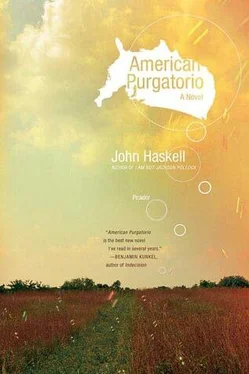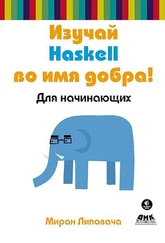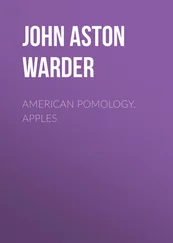John Haskell - American Purgatorio
Здесь есть возможность читать онлайн «John Haskell - American Purgatorio» весь текст электронной книги совершенно бесплатно (целиком полную версию без сокращений). В некоторых случаях можно слушать аудио, скачать через торрент в формате fb2 и присутствует краткое содержание. Год выпуска: 2006, Издательство: Picador, Жанр: Современная проза, на английском языке. Описание произведения, (предисловие) а так же отзывы посетителей доступны на портале библиотеки ЛибКат.
- Название:American Purgatorio
- Автор:
- Издательство:Picador
- Жанр:
- Год:2006
- ISBN:нет данных
- Рейтинг книги:3 / 5. Голосов: 1
-
Избранное:Добавить в избранное
- Отзывы:
-
Ваша оценка:
- 60
- 1
- 2
- 3
- 4
- 5
American Purgatorio: краткое содержание, описание и аннотация
Предлагаем к чтению аннотацию, описание, краткое содержание или предисловие (зависит от того, что написал сам автор книги «American Purgatorio»). Если вы не нашли необходимую информацию о книге — напишите в комментариях, мы постараемся отыскать её.
Los Angeles Times
American Purgatorio — читать онлайн бесплатно полную книгу (весь текст) целиком
Ниже представлен текст книги, разбитый по страницам. Система сохранения места последней прочитанной страницы, позволяет с удобством читать онлайн бесплатно книгу «American Purgatorio», без необходимости каждый раз заново искать на чём Вы остановились. Поставьте закладку, и сможете в любой момент перейти на страницу, на которой закончили чтение.
Интервал:
Закладка:
So I apologize. “I didn’t mean to…”
“Go fuck yourself,” he says.
I stand there, not moving.
“Fuck you,” he says, and he walks away.
And then I walk away.
And ever the man to adust, I adjust to this. Okay, I think, and I walk to another beach. I have my meeting with Linda, and this meeting has become, or Linda has become, not the light at the end of a tunnel because I’m not in a tunnel, but a beacon, let’s say, or a lighthouse.
I take a swim that afternoon. In my underwear I swim out far enough so that I’m floating in the salt water, beyond where the waves are breaking, away enough from everything I know to feel free of everything I know. I can feel the water surrounding my skin, the buoyancy of the water, the swells of water cradling me. I imagine what it might be like, taking a last breath and going down, under the water, holding my breath until I can’t hold it anymore and then, when the time comes, when the breath runs out, to let the water come into me and take me. That would be fine. It would almost be desirable, except there’s the human urge to maintain buoyancy. I can feel the water pushing me, incessantly, back to the shore, back to the world. And after a while I’m ready to go back. I’m ready to go back, and yet at the same time, I feel that I could float on the water forever.
VII. ( Avaritia )
1
Although the idea of sin is almost extinct, there are still certain things, certain habits of mind around which human beings seem to orbit. By habits of mind I mean the distractions that fill our world, the things we hate and love and get used to. We don’t want to let them go. I don’t want to let them go. I’m standing at the La Jolla Cove, in San Diego, orbiting now around something, and whatever it is, I can feel it pulling me. I’m looking out over the green lawn with the cypress trees and palm trees, and there’s Linda, spreading a blanket on the grass. She’s sitting on her knees, pulling out picnic items from a wicker basket.
It’s sunny and cool and I sit beside her on the worn wool blanket. I’m looking forward to talking with her, to sharing with her something profound and personal. I’m searching, down in what I call my gut, for something with which to begin our conversation, and it’s not that I’m empty, but before I can find anything down there, or even find the place where something might be hidden, she asks me a simple, unprofound question about living on the beach.
“Living?” I say.
“Isn’t that what you do?”
“Well, yes,” I say.
“I don’t see how you manage,” she says.
I shrug. I don’t know what to say. There’s nothing in me that I can think of. I’m relying on her to do the talking.
“It’s a beautiful day today,” she says.
We both look out to the sea. And as we do, I can sense her go into herself, into her private thoughts, which is where I would like to go, into her life and her personality, to reach across the space between us and find — not love, but there’s something I want from her, a feeling I want to have, and if I could get it, then love wouldn’t matter.
“I hope it lasts,” she says.
“Me too,” I say.
My interest in her is obvious. She can see that I like her, and although she likes that, because she doesn’t want to lead me on, she begins talking about seagulls. She says they make her nervous. She tells me about an arch that used to exist, carved by the sea in the sandstone cliffs, and that over time, because of the sea’s incessant pounding, the bridge of the arch has worn away, and the thing that used to be there, that you used to be able to walk across, is gone.
When I don’t respond about the rocks, she begins busying herself with the picnic basket. She’s brought olives and napkins and sandwiches and she begins unpacking and organizing these things on the green blanket. The seagulls are flying overhead, gliding against the breeze off the water, and one seagull drops a load of shit. It lands in the grass at the edge of the blanket and she doesn’t like it. She stands up to move the blanket, but I have an idea. “An idea,” I say, and I walk over to a wooden building at the edge of the grass. It’s a bridge club for senior citizens and some broad-leafed plants are growing near this building. I find a large flat leaf from the bottom of a bush and I pull it off the stalk. I go to the turd and attempt to scoop the turd up in the leaf. But because it’s not a solid piece of turd, it doesn’t want to be scooped up. “Come on,” I say. I’m talking to the little gray guano. “Come on into the leaf.” And it’s easier, in a way, talking to a turd than a human being. And because it’s also slightly ridiculous, Linda begins smiling. And smiling is good, so I keep trying, unsuccessfully, to scoop it up. She’s still smiling when we finally decide to move the blanket, and when we do, and as her smiling dies down, I start wondering, Why couldn’t I be with her? Why couldn’t that be my life? We seem to get along, and I’m energized by this sense of getting along and the potential for future getting along. When she pulls at the bottom of her shirt I tell her that I understand how someone might want that.
She holds up the arm of her yellow shirt. “It wicks moisture away from the body,” she says.
“Your shirt,” I say.
“Supposedly.”
She’s talking about her shirt.
“What do you mean?” she says.
“I mean that it must not be made of cotton,” I say.
And although our conversation is not in absolute sync, it doesn’t matter because in my proximity to her I feel that I exist. I believe the casual touching, as we reach for sandwiches, and her acknowledgment of that touching, means that the world we’re creating is real. I’m enjoying the sense of reality, thinking about how I can maintain my promixity to that reality when she begins unwrapping her sandwich. My sandwich is still in its plastic on the blanket, but she unwraps hers. She begins eating hers. Not just eating; she brings her whole attention to the act of eating, absorbing herself in the fact of eating, staring at nothing as she chews each bite of basil leaf and mozzarella and the red tomato between the slices of bread.
I’m sitting cross-legged on the blanket, my knee almost touching her knee, but like a tree in the proverbial forest, I seem, for a moment, not to exist.
And then she finishes eating. She looks up.
“There you are,” she says, blinking her eyes. “Are you ready?”
She doesn’t focus immediately, but when she does she sees me, and we begin packing up the picnic supplies. You’d be able to see in my eyes that I want to stay with her or walk with her, to somehow be with her, and I’m disappointed that what I want doesn’t happen. She has to meet Geoffrey, she says. She’s in love with Geoffrey.
And because I’m disappointed, and because I’m letting that disappointment show, and because she doesn’t want to be the cause of my disappointment, she invites me to dinner.
“Tonight?” I say.
“If you want,” she says.
And I say that yes, I can make it. I have no previous engagements. I tell her I’d be happy to come, and I want her to see that I know it’s just a dinner, nothing more, just an invitation, but that’s enough. If I could have that, I wouldn’t need anything more.
2
I spend the rest of the afternoon wandering along Garnet Avenue, aimlessly watching the quotidian world of people driving cars, walking dogs, stepping out of dental offices. In an effort to merge with that world I walk up to a gray-haired woman and ask her for directions to the nearest supermarket. Even though I already know where the supermarket is, I’m grateful to the woman for talking to me. I can tell she’s happy to talk, pleased to be practicing the ritual of talking, glad to be useful or real. And for a few minutes I feel real. But I can also feel myself fading, feel that the woman, even before she ends her speech, has forgotten I’m there, that even before she turns and walks away, the brief reality we’d created is gone.
Читать дальшеИнтервал:
Закладка:
Похожие книги на «American Purgatorio»
Представляем Вашему вниманию похожие книги на «American Purgatorio» списком для выбора. Мы отобрали схожую по названию и смыслу литературу в надежде предоставить читателям больше вариантов отыскать новые, интересные, ещё непрочитанные произведения.
Обсуждение, отзывы о книге «American Purgatorio» и просто собственные мнения читателей. Оставьте ваши комментарии, напишите, что Вы думаете о произведении, его смысле или главных героях. Укажите что конкретно понравилось, а что нет, и почему Вы так считаете.











